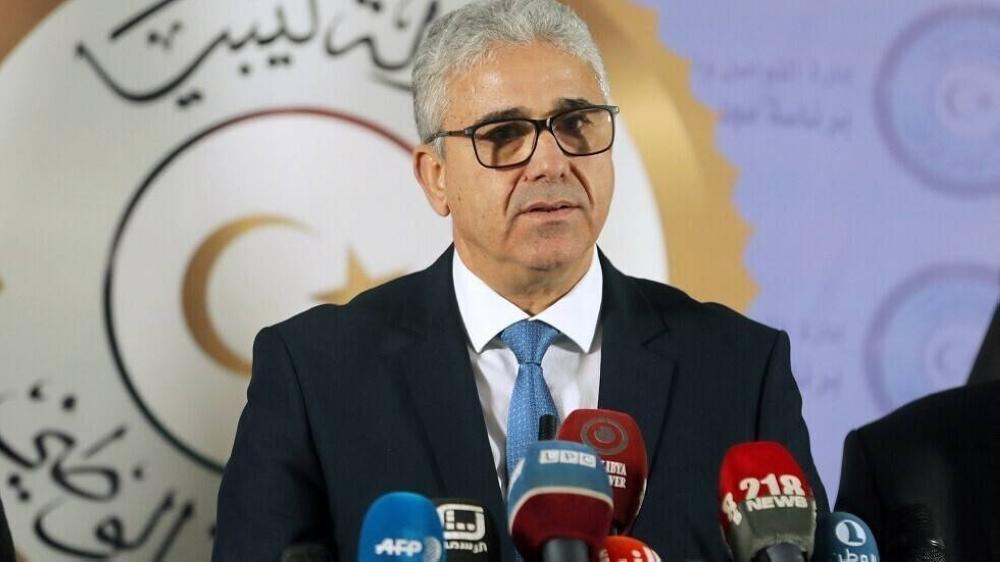Tripoli - (AFP) - The new Libyan government, headed by Fathi Bashagha, was sworn in Thursday before the House of Representatives held in Tobruk (east), in the absence of a number of ministers, and after the rival government headed by Abdul Hamid al-Dabaiba was accused of trying to obstruct the process.
On Tuesday, the House of Representatives gave the Bashagha government confidence, to replace the Dbeibeh government, which refuses to relinquish its position except to an “elected authority.” And set a date for her legal oath today.
Fathi Bashagha, along with a number of his ministers, took the legal oath before the House of Representatives. A number of channels and websites quoted the session live on air. Three ministers were unable to attend the session after being detained by armed men, according to media reports and Bashagha himself, while the Minister of Economy announced his withdrawal from the government before the session. Other ministers were absent without knowing the reasons.
The government formation consists of forty ministers originally in a country that has been suffering for years from successive wars and deep financial, economic and political crises.
In a speech he delivered after taking the legal oath, Bashagha said, “I condemn the unjustified escalation by some parties to prevent some ministers from taking the oath. ". He was referring to the ministers of foreign affairs, culture and technical education.
And he added, “We are advocates of peace in word and deed, and today some want to drag us into wars and fighting, but we will not give them a chance and we will not shed a single drop of blood.”
Then he added, "But we will not allow this to continue, and we have initiated the procedures for taking power from within Tripoli by the force of law."
He reaffirmed the work "with full force to end the transitional stages and reach the elections."
Bashagha had accused Al-Dabaiba of preventing members of his government from traveling from Tripoli to Tobruk in the east of the country, where the parliament is located, by closing the airspace.
Dabaiba's government has not yet issued any official comment on these accusations.

The Minister of Economy, Jamal Shaaban, announced his refusal of his position “in absolute rejection and in solidarity with the Libyan people,” questioning the voting process that took place in the confidence session.
The United Nations expressed its concern about the atmosphere that accompanied the process of granting confidence to the new government.
And she confirmed in a press statement that she was "concerned about reports that voting in the House of Representatives session did not live up to the expected standards and transparency, with a threat occurring before the session."
The House of Representatives appointed, at the beginning of last month, the former Minister of Interior and influential politician, Fathi Bashagha, 60, as prime minister.
This came after the House of Representatives adopted a new road map according to which the government would be re-formed and elections would be held within a maximum of 14 months, which caused division and rejection about postponing it to this date, which some considered distant, while these elections were supposed to have been held in end of last year.
The Libyan Political Dialogue Forum appointed Al-Dabiba at the head of a transitional government whose mission is to unify institutions and lead the country to presidential and legislative elections, which were scheduled for December 24th.
However, deep disagreements have led to the indefinite postponement of these elections. The international community had pinned great hopes on it to contribute to the stability of a country that was torn apart and has been in chaos for 11 years.
There are currently two prime ministers in power, and the position of the international community on this is not yet clear, and warnings are escalating that the presence of two governments would be the beginning of a new political division, such as the one the country witnessed with “two executive heads” over many years before reaching a political agreement under the auspices of the United Nations. His path began to be implemented with Dabaiba assuming the presidency of a “national reconciliation” government.
Political and military parties in the west of the country, where the government is based, the Oil Corporation, the Central Bank and most sovereign institutions, oppose Bashagha assuming the presidency of a new government, considering that it came as a result of a deal concluded with Lieutenant General Khalifa Haftar, the strong man in the east of the country.
Most of the influential parties in western Libya reject that Haftar is part of the problem and not the solution.
Political analyst Imad Jalloul says, "Everyone knows very well that Bashagha's arrival to this position came after an agreement with Haftar to remove Dabaiba, who is their strong competitor in the presidential elections."
He added, "Today, the first message reached him that the freedom of three ministers from his government was seized, a message that the Bashagha government does not enjoy support in the political decision-making position in the west of the country, and Tripoli in particular."
He believes that Dabaiba “opened the door to confrontation with Bashagha without hesitation, and even threatened to use force in the event of attacking the government headquarters in the capital,” noting that despite Bashagha’s declaration that he wanted to take power peacefully, “no one can ignore Faisal in the military confrontation.” ".
